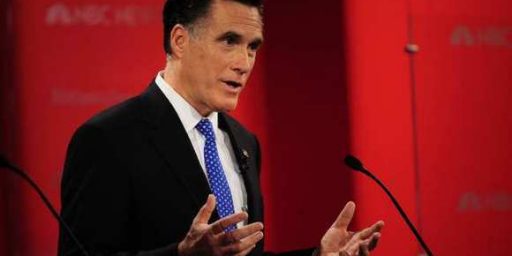Health Care Reform Tax on Low Income Earners
James Capretta does a back of the envelope calculation on the Baucus health care reform bill and concludes that it would be like having a 70% marginal tax rate on the low income.
According to CBO, family coverage in 2016 is likely to cost about $14,400 under the so-called “silver option” in the health-care reform plan sponsored by Senate Finance Committee Chairman Max Baucus. In the Baucus plan, a family of four at the poverty line (about $24,000 in 2016) would have pay to about $1,400 toward coverage, with the federal government paying the other $13,000 on their behalf. In addition, the government would also provide $3,500 to reduce the family’s deductible and co-payment costs for health services. Thus, the new entitlement provided by the Baucus bill would be worth a whopping $16,500 for a family at the poverty line.
As incomes rise, however, the Baucus bill cuts the value of the entitlement. A family with an income at twice the poverty line, or $48,000 in 2016, would get $9,072 in federal assistance for coverage — still a substantial sum. But it’s $7,400 less than the family would get if they earned half as much. The Baucus plan thus imposes an implicit marginal tax rate of about 30 percent ($7,400/$24,000) on wages earned by families in this income range.
And that would come on top of the high implicit taxes already built into current law. Low-wage families with children also get the Earned Income Tax Credit (EITC). The EITC boosts incomes for those with the very lowest wages, but it is also phased-out as incomes rise. Past a certain threshold (about $21,400 in 2016), the EITC is reduced by $0.21 for every additional $1 earned. Throw in the individual income tax rate (15 percent) and payroll taxes (7.65 percent), and the effective, implicit tax rate for workers between 100 and 200 percent of the federal poverty line would quickly approach 70 percent — not even counting food stamps and housing vouchers.
That is a substantial marginal tax rate, and would serve as a disincentive towards working towards getting higher paying jobs. I also agree it would be a good idea if the CBO were to do a much more thorough analysis of this bill to verify these calculations.
Update: Via Greg Mankiw I see that the CBO has released some analysis on incomes, premiums, and so forth under the Baucus bill, and for the upper incomes there are marginal tax increases, not sure about low income earners. Also, if you are single you will get hit pretty hard even when your income goes from $26,500 to $32,400, the implicit marginal tax rate on that income due to the change in premiums is 24%. Then add on for payroll taxes, income taxes and so forth.
There is also this CBO policy brief that discusses the issue,
New subsidies might be created to cover the costs of private health insurance, and they could be gradually reduced over a specified income range in a variety of ways—with different implications for marginal tax rates and work incentives. Those subsidies could be gradually reduced at a uniform rate, causing implicit marginal tax rates to rise by the same amount for all recipients in the phase-out range. For example, a proposal might provide families whose income was at the federal poverty level (roughly $23,000 for a family of four in 2013, the year in which many proposals would take effect) with fully subsidized health insurance valued at $15,000. That subsidy might be gradually reduced as income increased, and families whose income was above 400 percent of the poverty level ($92,000) might be ineligible for any subsidy. In that case, marginal tax rates would go up by about 22 percentage points for all families whose income was between 100 percent and 400 percent of the poverty level.
A 22% marginal tax rate on households with income between 100% to 400% of the poverty level could reduce incentives for those households to decision on how much to work. If taking on a new job means less leisure time as well as a higher marginal tax rate a person might decide not to take the job even if the pay is higher.
And as Greg Mankiw points out, if people respond to these implicit changes in the marginal tax rates by working less, then it is possible that in the future GDP is lower and that payroll taxes are also lower. Thus exacerbating our already serious problems with Social Security and Medicare.





That’s a novel way of calculating income, Steve, and I’m going to need to think a bit before I decide whether it makes any intuitive sense to me or not. I don’t usually think of the income I might have realized if conditions were other than they are as being real income.
This is sweet! Screw the poor!
Dave,
I’m not sure I see what you are talking about. The marginal tax rates are calculated by taking the change in benefits (health insurance subsidies) divided by the change in income (e.g. $7,400/$24,000 = 0.31 or 31%). Pretty standard practice.
Seems like further class stratification and more barriers to class mobility are just what the doctor ordered. Can’t wait for President Obama to make his own Dr. Pepper commercial.
Steve, doesn’t Capretta’s figures assume that said person currently doen’t have health insurance? The average family policy currently costs $13,375. CITE If a comparable policy would cost $14,400 in six years under the Bachus plan, then that person is not going to have notably increased out-of-pocket expenses. It’s the people who currently don’t have health insurance, and particularly those who can’t afford it that are hurt by going from $0 upwards towards $14,400 per year.
PD,
Depends, if they are currently paying out of pocket (which I serioulsy doubt for people at the poverty line) then no, your conclusions are incorrect.
See currently most people who have insurance get it via their employers and that “income” is essentially tax free. Under the Bauchus plan that would no longer be the case.
The Capretta article mostly proves that the very poor get more help. The rest of his points do not answer what one really wants to know. What are people in those income brackets paying for health care now, and what will they pay if this bill passes. People in this group are already paying something for health care. Next, what do they get for what they pay?
Does Mankiw cite studies comparing generalized tax increases of 22%, ie taxes go up 22% but you see no specific increase in benefits, vs tax increases in 22% where all the benefits go to the person paying the tax increase?
Steve
Yes, and after that your comment goes a bit off the rails. They get help, and we can impute income for this help. And since that help diminshes as income goes up, it is like having a tax on that help. That is why its important, because this implicit tax could discourage people to take higher paying jobs.
As always, I’m impressed by the concern conservatives show towards the poor. They want to protect the poor against unemployment by opposing increases in the minimum wage, they want to help the poor get ahead in life by cutting taxes on dividends and capital gains, and now they want to protect the poor against the scourge of health insurance. Truly, the poor in our wonderful countary are lucky duckies, and people like Steve Verdon are their greatest benefactors.
Like Dave I find something non-intuitive about the income and marginal rate calculation … but I’ll just say that this is where the catch-22 puts us. Arguably none of us want this mandated private insurance, but it is nonetheless the only politically viable path.
You and I may not like it for different reasons, but that disagreement, that classically post-millennial barbell politics is what drives it.
I still say why can’t we just grant vouchers for basic care, allowing consumers to shop for providers, and without this perverse tax effect?
I suppose some here might still be saying “why can’t we do nothing?”
Split the difference between those plans and we have something like this.
And Stan apparently believes you can only help the poor by punishing the rich in a zero sum game. Wealth is never created but only stolen by the greedy, uncaring rich or happily redistributed by the great and good government to the poor.
Charles, a democracy can stand only so much inequality. Since the Reagan revolution, your side has been conducting class warfare on the poor. Your side is winning, and I’m sure it’s been very good for you and your family. But don’t kid yourself. It’s not good for the country, and I think you know it and won’t admit it.
Well I just got a letter two days ago telling me my premiums were going up 29%, effective October 1st (slightly retroactive!).
This anecdote is mostly unhelpful except to illustrate that we’re going to be paying a LOT more with or without health care reform.
In my experience people pay more attention to net take home pay rather than marginal tax rates. A family of 4 going from $24,000 to $48,000 would have a net income increase of about $10,500. I am willing to venture few people would turn down that pay increase.
And right there you go completely off the rails. You wont look like such a complete idiot if you paid just a bit more attention.
Ahh, question begging. On what do you base this claim?
I’d say that assigning blame like this is something a petulant child does. For example, one reason wages are stagnant is the rapid rise in health care costs? What role did medicare play in that and what role did “progressives” play in getting medicare in place?
Ahh, yes Stan is the one true patriot here.
Franklin,
What makes you think you wont be paying more with health care reform? Becuase you are told its “free” or that they will subsidize it? Show up and show them your new premium and see what happens.
The current reform bill we are most likely to get will cement in place the current health care system. You know, the one that is so broken we have to reform it.
Mike,
Yes, and an increase in the marginal tax rate means that their take home pay after a raise will be less than if the Baucus bill does not pass.
Yes, and they likely went from paying virtually no federal income tax to suddenly paying almost $14,000.
Sure, if I don’t have to work much harder, didn’t have to go to school, maybe take on additional debt for said school, move, or any other number of things that might make people say, “Thanks, but no thanks.”
True story: when my current employer was having tough times I started looking. Got an offer, with a sizeable increase in annual salary, a moving bonus ($10,000) and in Santa Barbara! Whats not to love. How about the housing prices in Santa Barbara? After looking at homes and realize we’d likely have to rent again I went to the head of my department and asked about my future with the company…I didn’t want to move and I wanted to turn the offer down.
Yes, its an anecdote, but the point is that circumstances aren’t so simple as just, “Oh, here you get more money.” The implicit tax rates might make what looks like a $24,000 gross pay raise look alot less attractive after all the taxes are factored in.
But hey, with the Baucus bill we’ll likely have actual tax increases on top of these implicit marginal tax rates too as the whole system turns to shit.